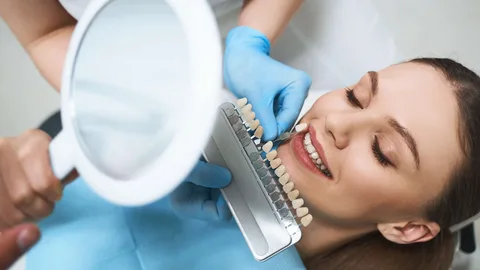Knowing your options can make all the difference when you’re deciding how to care for your teeth. Across Adelaide, dental clinics follow consistent principles: regular check-ups, personalised hygiene routines, modern diagnostic tools, and timely treatment that protects as much natural tooth structure as possible. Whether you’re looking for preventive care, white fillings, clear aligners, or dental implants, understanding how each treatment works—and when it’s recommended—can help you choose with confidence.
Table of Contents
Why Preventive Care Is Always the First Step
Preventive dentistry aims to stop problems before they start. A typical check-up in Adelaide includes a scale and polish to remove plaque and tartar, fluoride application if needed, and a caries risk assessment. Your Adelaide dentist may also look for signs of wear, enamel erosion, tooth sensitivity, and clenching or grinding.
For kids, preventive options include fissure sealants to protect the deep grooves in molars. Eligible families can also access Medicare’s Child Dental Benefits Schedule (CDBS) for basic care.
Small changes—like flossing, using the right toothpaste, and adjusting your diet—can significantly improve your oral health. Your review interval is based on your risk factors, not just the calendar.
How do digital X-rays, OPG and CBCT improve diagnosis?
Today’s digital imaging tools offer a clearer picture with less radiation. Here’s what’s commonly used:
- Bite-wing X-rays: Detect hidden decay between teeth
- OPG (panoramic X-ray): Shows wisdom teeth, bone levels, and jaw joints
- CBCT scans: Essential for implant planning and complex root canal work
- Intraoral cameras: Capture close-up photos for tracking changes
These tools help Adelaide dentists plan accurately—especially for surgical, endodontic, or orthodontic cases—and support more conservative treatment.
White Fillings and Onlays: What They Fix and When
White fillings (made from composite resin) are ideal for small cavities or chips. They’re bonded directly to tooth enamel, often under rubber dam isolation, to ensure a strong seal.
When a tooth is badly damaged or has large restorations, ceramic onlays or crowns are used. These indirect restorations help distribute biting forces evenly and protect what’s left of the tooth.
Crowns and Same-Day Options: When They’re Needed
You might need a crown if your tooth has a deep crack, a large filling, or has had root canal therapy. Many Adelaide clinics now offer digital scanning and same-day crown milling, so treatment can be completed in just one visit, depending on the case.
Material matters too. Zirconia crowns offer strength, while layered ceramics are often used when aesthetics are a priority.
Teeth Whitening in Adelaide: Options and Suitability
Two main types of professional whitening are available:
- In-chair whitening: Fast results, done under supervision
- Custom take-home trays: Gradual, more controlled whitening using dentist-dispensed gels
Not everyone is a candidate. Your emergency dentist will assess your enamel, the cause of discolouration, and sensitivity before recommending a plan.
Veneers vs. Composite Bonding: What’s the Difference?
Both improve the look of your teeth.
- Composite bonding is fast, cost-effective, and often completed in one visit. It’s reversible too.
- Porcelain veneers take more time and planning but offer longer-lasting, highly aesthetic results.
Your dentist may use digital smile design or mock-ups so you can see what the final result might look like.
Clear Aligners vs. Braces
Clear aligners (like Invisalign) are removable and nearly invisible, making them popular with adults. They’re best for mild to moderate crowding.
Fixed braces—whether metal or ceramic—are often better for complex tooth or jaw movements.
Whichever path you choose, retainers are essential after treatment to keep teeth from shifting back.
Dental Implants and Oral Surgery: Key Info
Implants replace missing teeth using a titanium post and a custom-made crown. They can also support bridges or full-arch solutions like All-on-4.
A CBCT scan helps assess bone quality and position. In some cases, a bone graft or sinus lift is needed before placing an implant.
Oral surgery—such as extractions (including wisdom teeth)—is guided by digital imaging and follows strict post-op protocols.
Interestingly, the connection between oral and Heart Health continues to gain attention. Just as precision and planning are essential in implant dentistry, so too is early detection and proactive care critical in maintaining cardiovascular wellness. Learn more about how habits affect your Heart Health and why preventive care matters in every aspect of your health.
Root Canal Therapy: When It’s Needed and What to Expect
Root canal treatment removes inflamed or infected pulp from inside a tooth, then seals the area to prevent reinfection.
Modern tools, including microscopes, rubber dam isolation, and rotary files, make the process predictable and much more comfortable than it used to be. Back teeth treated this way usually need a crown or onlay for long-term strength.
Gum Disease: Non-Surgical Treatments That Work
Mild to moderate gum disease can be managed with scaling and root planing, which cleans below the gumline. Your dentist or hygienist will reassess your gum health at follow-up visits and help refine your brushing technique.
Supportive care like interdental brushes, better flossing, and attention to diet all contribute to stable gum health.
Dentures and Implant-Retained Options
Partial or full dentures replace missing teeth and improve chewing, speech, and appearance. Over time, relines may be needed as your mouth changes shape.
For better stability—especially in the lower jaw—implant-retained dentures provide a secure fit and greater confidence.
Why Mouthguards and Night Guards Matter
A custom mouthguard protects teeth and jaws during contact sport. Over-the-counter versions don’t offer the same protection.
If you grind or clench, a night guard (occlusal splint) reduces wear, protects restorations, and may help with jaw comfort. Precision-fit guards are made from digital scans or impressions.
Most Common Dental Treatments in Adelaide
| Treatment | What It Does | Visit Length | Visits | Lifespan* | Same-Day Option? |
| Check-up + Clean | Prevents disease | 30–60 mins | 1 | Ongoing | — |
| Digital X-rays / OPG / CBCT | Accurate diagnosis | 5–20 mins | 1 | — | — |
| White fillings (composite) | Repairs decay or chips | 30–60 mins | 1 | 5–10 yrs | ✅ |
| Crowns / Onlays (ceramic) | Strengthens weakened teeth | 60–120 mins | 1–2 | 10–15 yrs | Often |
| Teeth whitening | Brightens smile | 60–90 mins | 1–2 | 6–24 months | ✅ (in-chair) |
| Veneers / Bonding | Improves shape & colour | 90–150 mins | 1–3 | 5–15 yrs | ✅ (composite) |
| Clear aligners / Braces | Straightens teeth | Varies | Multi | Lifelong (ret.) | ❌ |
| Dental implants | Replaces missing teeth | 45–90 mins | 2–3 | 15+ yrs | ❌ |
| Root canal therapy | Saves a natural tooth | 60–90 mins | 1–3 | Depends on case | ❌ |
| Gum therapy (non-surgical) | Treats gum disease | 45–90 mins | Multi | Ongoing | ❌ |
| Dentures / Overdentures | Replaces multiple teeth | 30–60 mins | 3–5 | 5–10 yrs | ❌ |
| Mouthguards / Night guards | Protects teeth | 15–30 mins | 2 | 1–5 yrs | ❌ |
* Lifespan depends on your home care, bite, and regular reviews.
Match Your Concern to Likely Treatments
| Concern | First-Line Options | Other Possibilities |
| Toothache / Sensitivity | Exam, X-rays, white filling | Root canal, crown, extraction |
| Chipped Tooth / Wear | Bonding, onlay/crown | Veneers, night guard (if grinding) |
| Yellow or Stained Teeth | Whitening trays or in-chair | Veneers for deep or intrinsic stains |
| Crooked or Gappy Teeth | Clear aligners, braces | Veneers for mild cosmetic spacing |
| Missing Tooth | Implant + crown | Bridge, partial denture |
| Bleeding Gums / Bad Breath | Periodontal therapy, hygiene plan | Rinse, referral if severe |
| Wisdom Tooth Pain | OPG + evaluation, extraction if needed | Monitoring or referral for sedation |
| Loose Denture | Reline or new denture | Implant-retained denture |
| Sports Risk | Custom mouthguard | — |
| Jaw Pain / Snoring | Night guard, airway review | TMJ physio, sleep study referral |
What Should Guide Your Treatment Decisions?
- Fastest visible result
- Longest-lasting fix (with regular care)
- Least invasive option first
- Whether same-day treatment is possible
- Suitability for your age, habits, and health
- How much bone, enamel, or gum support is available
- Funding pathways (e.g., private cover, CDBS for children)
What Builds Trust in a Dental Practice?
- Early diagnosis helps avoid invasive, expensive procedures
- A natural-looking smile that functions well and lasts
- Digital diagnostics for precision and minimal intervention
- Clear treatment plans with written post-op instructions
- Health fund claiming on the spot (HICAPS)
- Easy-to-book reviews and tailored home-care advice
- These elements all enhance not just clinical outcomes but the overall viewing experience of dental care—how comfortable, clear, and reassuring your journey is from start to finish. Much like tuning into expert content and getting the most out of your watching experience, a seamless, patient-focused dental process makes every visit feel more informed and accessible. Discover more about optimizing your “Viewing Experience,” whether you’re in the treatment chair or watching from the comfort of home.
Why Adelaide Patients Choose Mend Dental
Mend Dental offers a full range of services—preventive, restorative, cosmetic, orthodontic, and implant—in one clinic. Using advanced diagnostics, they plan treatments that are conservative yet effective. You can expect:
- Tooth-coloured restorations
- Same-day ceramic crowns (where suitable)
- Clear aligners with long-term retention
- CDBS-eligible care for children
- Night guards for grinding
- Clear, step-by-step aftercare
Everything’s designed to support healthy, lasting results.
Credible Sources
- Australian Dental Association – Oral Health Topics
ada.org.au/Your-Dental-Health - AIHW – Oral Health in Australia
aihw.gov.au/reports/dental-oral-health/oral-health-and-dental-care-in-australia - Healthdirect – Dental Health
healthdirect.gov.au/dental-health - Services Australia – CDBS
servicesaustralia.gov.au/child-dental-benefits-schedule - SA Health – Oral Health Info
sahealth.sa.gov.au
Frequently Asked Questions
1. How often should adults in Adelaide book a dental check-up and clean?
That depends on your oral health risk. Many adults benefit from a check-up every 6 to 12 months, but your dentist will adjust that based on your history with decay, gum condition, saliva flow, medications, diet, and how well you care for your teeth at home.
2. Is in-chair whitening better than custom take-home trays?
Both can deliver great results. In-chair whitening is faster and professionally supervised, while take-home trays give you gradual, controlled brightening. Your dentist will guide you based on enamel health, the type of staining, and your sensitivity level.
3. Do clear aligners work as well as braces?
Yes—for many people. Clear aligners work well for mild to moderate crowding or spacing and are removable for meals and cleaning. For more complex tooth or jaw movements, fixed braces may be better. Regardless of the option, retainers are key after treatment to keep your teeth in place.
4. What’s the difference between a crown and a veneer?
A veneer is a thin layer placed on the front of a tooth to improve its appearance. A crown covers most of the tooth to restore strength—usually after serious damage or root canal treatment. Your dentist will help decide which is better based on your bite, enamel, and cosmetic goals.
5. Are children’s visits covered under the CDBS in Adelaide?
They can be. If your child is eligible and your clinic participates in the Child Dental Benefits Schedule (CDBS), basic services like check-ups and preventive care may be covered. Bring your Medicare card, and the clinic can check eligibility for you.
6. When should I consider a night guard or a sports mouthguard?
If you play contact sports, a custom sports mouthguard is a smart choice to protect teeth and jaws. If you grind or clench your teeth—especially at night—a night guard can help prevent damage and extend the life of dental work like crowns, veneers, and implants.


